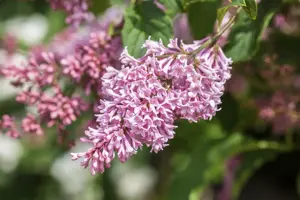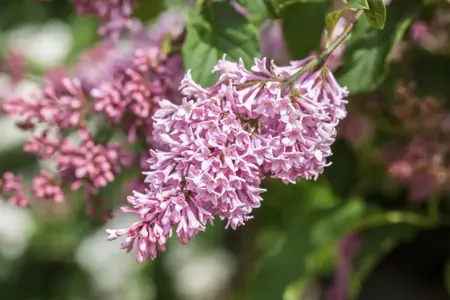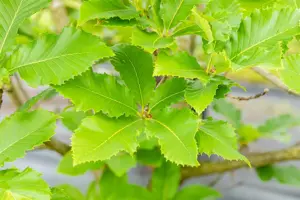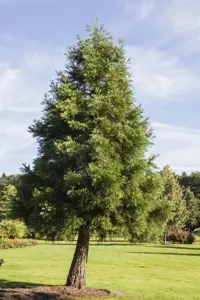Syringa prestioniae 'Jeftin' (Pinktini) - 50-60 CM C10
Syringa prestioniae 'Jeftin' (Pinktini) - 50-60 CM C10
Synonym
Synonyms (botanical): Syringa x villosae.
Bulletpoints
* suitable for flowering hedges
* the flowers are highly favoured by bees, bumblebees and hoverflies
* cut flower
* strongly scented flowers
* attractive yellow autumn colouring
* easy to care for
* resistant to urban climates and deer
Leaves
Attractive yellow autumn colouring.
Growth habit
Lilac is bushy, upright and dense in structure.
Water
The plant has a medium water requirement.
Location
Preferred location in a sunny position.
Soil
Normal soil.
Planting time
Container plants can be planted all year round, except when the soil is frozen and in summer heat (over 30°C).
Tasks
- Apply compost: In the period from November to December.
Care
- A slow-release fertiliser can be used in spring. This releases the nutrients slowly and continuously so that the plant is evenly supplied over a longer period of time.
- Watering less frequently, but thoroughly and thoroughly, encourages the plant roots to penetrate deeper into the soil. This helps the plant to survive periods of drought.
- Lilacs flower on biennial wood, so the plant should be thinned out after flowering or plants that have grown too large should be pruned.
- This plant does not tolerate heavy soil. If necessary, the soil structure can be improved when planting by working in sand and mature compost.
Flower
The lilac-coloured flowers appear in panicles from the end of May to June. They are strongly scented.
Use
Cut, solitary, group planting, bee pasture, hedge

- Article number45
-
EAN codeSYPJEFTI-2050060C10
- Latin nameSyringa prestioniae 'Jeftin' (Pinktini)
- catalogLandscape shop




